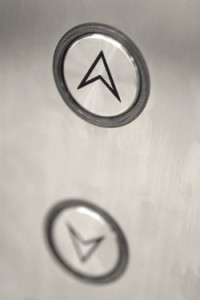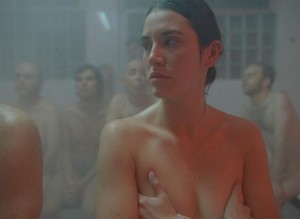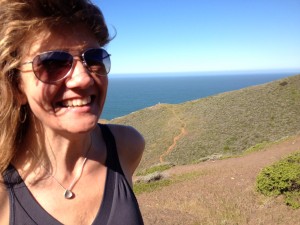Two Pieces by Karin Cotterman
By Karin Cotterman
Radiation/Journey to basement and waiting room
 I enter the sliding glass door of the building as if I am going to see my dentist who is on the 3rd floor. I ride up with others, medical professionals, patients and visitors to the 5th floor, where I don’t turn toward the plastic surgeon’s office. And every time I turn left, to the corridor that takes me to the other wing, I think about how she didn’t seem to know that my radiation treatment would be in the basement of this building, adjacent to where her office is, and how that seemed like some kind of willful ignorance, some desire to ignore the fact that she has patients who are less than perfect, that require further treatment that will change the size and shape of skin and breast she has built. I remember how dangerous this felt to me, this seeming denial of the circumstances that brought me to her in the first place. How it belied her desire to treat me as if this entire process is elective from start to finish.
I enter the sliding glass door of the building as if I am going to see my dentist who is on the 3rd floor. I ride up with others, medical professionals, patients and visitors to the 5th floor, where I don’t turn toward the plastic surgeon’s office. And every time I turn left, to the corridor that takes me to the other wing, I think about how she didn’t seem to know that my radiation treatment would be in the basement of this building, adjacent to where her office is, and how that seemed like some kind of willful ignorance, some desire to ignore the fact that she has patients who are less than perfect, that require further treatment that will change the size and shape of skin and breast she has built. I remember how dangerous this felt to me, this seeming denial of the circumstances that brought me to her in the first place. How it belied her desire to treat me as if this entire process is elective from start to finish.
In the second bank of elevators I push the “B” button, which takes me down past the emergency room, where weary friends and family with worried looks on their faces exit. Where the occasional staff member in scrubs returns to work with a new cup of coffee or the slight scent of cigarette on their skin. It is rare that a fellow traveler also journeys to level B, the deep underground, the basement absent any natural light. No windows, all recycled air pumped through giant beige tubes hanging from the ceiling. The occasional nurse or doctor or technician in the elevator will ask What floor? or when they push A and go back to their phone, or absent minded stare, I interrupt and ask, Can you push B for me? I feel them glance my way, assessing if I am a patient, what brings me to the basement, is it the random MRI, or does she have something inside her they are trying to kill off? I feel that pushing B is some sort of big “tell,” a way that I reveal to the world, or at least to staff that I am living my life on the side of the page that is labeled disabled. That I can hide this “tell” when I am dressed in street clothes after treatment; when I walk the street just past the hospital and try on shoes and touch sweaters so soft I can’t afford them, or buy a latte and eggs at the corner in an effort to pack enough protein into my body that I can stay awake for more than 2 hours. The ride to level B takes me from woman in the world to patient, to someone carrying a sickness that many people only whisper about, to being the woman in the waiting room, thin cloth gown wrapped around a scarred body, awaiting having her name called to journey back to past the sign that reads, Only patients and technicians allowed beyond this point.
It is as if as I move from the world outside, past the parking attendants, the dozens of people in the lobbies and elevators, to the waiting room where there are sometimes no other people, sometimes 10 other people, it is as if I am a bird flying with a flock and then slowly the other birds peel off, peel off to their dental appointments, off to their shopping excursions and coffee dates, off to see if their brother need stitches from his skateboarding accident, and then finally I peel off from other patients in the waiting room, peel off to where after the techs situate me on the table and adjust my body with great precision, and they finally peel off, too, leaving only me, alone, getting treated with poison so dangerous I am alone in a basement behind a 3 foot deep lead door.
How to say goodbye to your breast
 Take it to the ocean and surf, paddle, dive. Float on a board with a good friend nearby who makes you laugh so hard you pee your wetsuit.
Take it to the ocean and surf, paddle, dive. Float on a board with a good friend nearby who makes you laugh so hard you pee your wetsuit.
Take it to hot springs at low tide and soak. Notice the crabs tapping on the greenstone, the calcium carbonate veins embedded in the metamorphic rock. Evidence of time, pressure. Evidence of movement from the Equator to here. Talk to a longneck barnacle. Touch an ochre sea star. Step into the cold ocean and hyperventilate to the point that your friend takes you by the hand and walks you back to sand. Then, while nude, slip on a rock and end up in a compromising position, laugh, realizing you have completely lost your bearings and this is all right and possibly even necessary.
Send semi nude photos to the playa to be burned. Exploded with a firecracker at first light, near a tower built to confer all that is lost. Imagine the soft lights of dawn, the soft blues and emerging pinks of the sky, stark and clear with just a wisp of clouds. Imaging the loud crack, crack, crack announcing loss and wakefulness and a new day across the dusty circumference.
Take your body to the bathhouse, get a massage, scrub your skin clean, plunge into the cold pool and then into the warm pool and sit in the sauna and steam. Stand in the shower, head against the cold wall, crying. Fight the voice that tells you to toughen up. Allow yourself this grief. Stand there for what feels like a very, very long time. Let the hidden stall hold pieces of sadness, mix them with water and send them down the drain.
_______________________________________________________
 Karin Cotterman lives and works in San Francisco. You can read her recent work in Poets 11 2012 Anthology, a collection of writing from San Francisco poets. She also has work forthcoming in the Canadian Medical Association Journal. She received her M.A. in Creative Writing from San Francisco State University.
Karin Cotterman lives and works in San Francisco. You can read her recent work in Poets 11 2012 Anthology, a collection of writing from San Francisco poets. She also has work forthcoming in the Canadian Medical Association Journal. She received her M.A. in Creative Writing from San Francisco State University.




0 comments